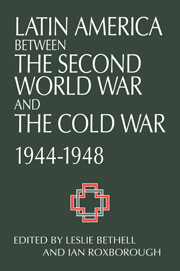Book contents
- Frontmatter
- Contents
- List of contributors
- Preface
- Introduction: The postwar conjuncture in Latin America: democracy, labor, and the Left
- 1 Brazil
- 2 Chile
- 3 Argentina
- 4 Bolivia
- 5 Venezuela
- 6 Peru
- 7 Mexico
- 8 Cuba
- 9 Nicaragua
- 10 Costa Rica
- 11 Guatemala
- Conclusion: The postwar conjuncture in Latin America and its consequences
- Index
Preface
Published online by Cambridge University Press: 04 May 2010
- Frontmatter
- Contents
- List of contributors
- Preface
- Introduction: The postwar conjuncture in Latin America: democracy, labor, and the Left
- 1 Brazil
- 2 Chile
- 3 Argentina
- 4 Bolivia
- 5 Venezuela
- 6 Peru
- 7 Mexico
- 8 Cuba
- 9 Nicaragua
- 10 Costa Rica
- 11 Guatemala
- Conclusion: The postwar conjuncture in Latin America and its consequences
- Index
Summary
This book has its origins in Leslie Bethell's interest in the historical fragility of democracy in Brazil, in particular his interest in the transition from the dictatorship of Getulio Vargas to a limited form of democracy in 1945-6, and in Ian Roxborough's interest in the Mexican model of state-sponsored labor unions, which included an interest in the so-called charrazo, the intervention of the state to prop up a conservative union leadership in 1948. A historian and a sociologist, academic colleagues and friends, discovered almost a decade ago that they were both interested, initially for different reasons, in the history of Latin America during the period from the end of the Second World War to the beginning of the Cold War.
Comparing what we knew about Brazil and Mexico and drawing on our (limited) knowledge of other Latin American countries during the years 1944-8, we came to the conclusion that despite differences of political regime and different levels of economic and social development, there were striking similarities in the experience of a number, perhaps a majority, of Latin American republics, and that a period generally recognized as critical in the history of most other regions of the world in the twentieth century represented a more significant conjuncture in the political and social history of twentieth-century Latin America than had hitherto been recognized. Moreover, although Latin America's participation in the Second World War had been only marginal (in military terms at least), and although Latin America was not at first a focal point of conflict in the Cold War, the nature, and more importantly the outcome, of the postwar conjuncture was determined in Latin America.
- Type
- Chapter
- Information
- Latin America between the Second World War and the Cold WarCrisis and Containment, 1944–1948, pp. ix - xiiPublisher: Cambridge University PressPrint publication year: 1993

